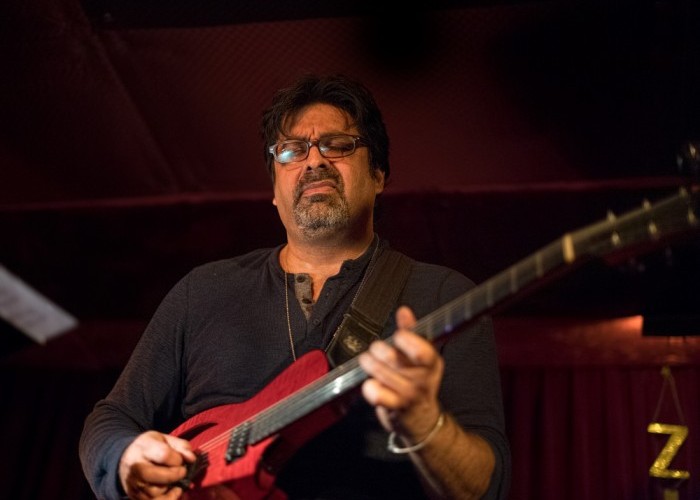Jan 13, 2026 2:09 PM
More Trump-Kennedy Center Cancellations
The fallout from the renaming of the John F. Kennedy Center for the Performing Arts to include President Donald…

Rez Abbasi’s Invocation performed Saturday at Zinc Bar as part of 2018’s Winter Jazzfest.
(Photo: Steven Sussman)If Winter Jazzfest acts as a kind of annual State of the Music address—and it does—then the ideal way to consume it must be with as broad a sampling as possible.
The centerpiece of each year’s festival is its Marathon, a two-night series that casts 125 artists across 11 Manhattan venues (and now three neighborhoods: initially confined to Greenwich Village, the increasingly large marathon has extensions into the East Village and TriBeCa), performing back-to-back 50-minute sets. With that kind of reach, creating a diverse itinerary for oneself wasn’t hard. In fact, it could be as easy as staking out a spot in one venue, like the West Third Street basement Zinc Bar, and letting the variety come to you.
Saturday, the marathon’s second night, at Zinc began with Greg “Organ Monk” Lewis, performing his recent composition The Breathe Suite with a trio that included guitarist Ron Jackson and drummer Jeremy “Bean” Clemons. Lewis, as his nickname suggests, made his mark by performing Thelonious Monk’s compositions on organ. The music on Saturday was far removed from that, however: It was a somber and tense tribute to some recent victims of racially motivated police killings. Fraught as his music was, Lewis’ grimace could have been taken for either anguish or delight, compounded by an occasional sound that as easily could have been laughter as groaning. It was only with the song “Aiyana Jones,” named for the Detroit 7-year-old slain in a police raid, that the pain in his face became unmistakable.
Rez Abbasi’s Invocation followed Lewis. The band is normally a quintet, but saxophonist Rudresh Mahanthappa was sidelined by a family emergency. Guitarist Abbasi, pianist Matt Mitchell, bassist Chris Tordini and drummer Dan Weiss fended for themselves with brilliantly gnarled, polyrhythmic results. As bandleader, Abbasi’s work was most prominent, with a uniquely thorny touch on the opening “Propensity” and unexpected rubato on “Unfiltered Universe.” But perhaps even more intriguing was the work of pianist Matt Mitchell. His playing moved like a low-register chant on “Unfiltered Universe,” establishing its own unique rhythm that ran against the grain, even in a polyrhythmic tune; it inspired Weiss to accompany him by switching from odd-accent stickwork to a brushed softshoe line.
Between Lewis’ organ and Abbasi’s guitar, the first two bands featured a fair bit of electric amplification. Fareed Haque and Goran Ivanovic’s acoustic-guitar duo, then, was a refreshing contrast. It was also surpassingly beautiful. The Chicagoans played intertwining lines on songs like “The Walls Of The White City” and “Gypsy Circus,” evoking both folk and classical guitar styles, as well as the gypsy jazz rhythms of Django Reinhardt. One could close their eyes and distinguish the players by Ivanovic’s harder, sharper touch, which was particularly potent on his strident “Prorok (The Prophet).” Haque’s softer tack served well on the wondrous “Seven Boats,” working out delicate harmonies as he improvised. “We’re each going to do a solo for you,” Haque promised the audience—disappointingly, though, he discovered their time was up.
Incredibly, none of these were the evening’s highlight. That came with saxophonist Eli Degibri and his quartet of young (twentysomething) Israelis: pianist Tom Oren, bassist Alon Nir, drummer Eviatar Slivnik. If there were expectations of exotic sounds, though, they were quickly disposed of. Degibri and company packed in as much soul as everyone else on the bill put together. The ensemble’s first tune, “The Troll,” nodded toward soul-jazz staples like “Hard Times”; with the third offering, “Even Bees Do It,” Degibri was sinking to his knees in a fervor, spurring Slivnik to a frantic rat-a-tat solo. As if to double down on the soulfulness of the affair, Degibri revealed that the band had recently recorded a rendition of Hank Mobley’s Soul Station, capping the set with two of its songs that included himself and Oren playing a transcription of Wynton Kelly’s piano solo on “This I Dig Of You.”
Degibri’s set had such a wallop that pianist Simona Premazzi’s quintet, which closed the evening, couldn’t help but suffer in comparison. The band can’t be faulted in any sense. Their music was accomplished, intriguing and highly imaginative, with trumpeter Mike Rodriguez wielding a deeply pretty tone and Premazzi taking a music-box staccato approach. It was a (relatively) disappointing end to an otherwise thrilling, wildly eclectic evening of music at Winter Jazzfest. DB

Belá Fleck during an interview with Fredrika Whitfield on CNN.
Jan 13, 2026 2:09 PM
The fallout from the renaming of the John F. Kennedy Center for the Performing Arts to include President Donald…

Peplowski first came to prominence in legacy swing bands, including the final iteration of the Benny Goodman Orchestra, before beginning a solo career in the late 1980s.
Feb 3, 2026 12:10 AM
Ken Peplowski, a clarinetist and tenor saxophonist who straddled the worlds of traditional and modern jazz, died Feb. 2…

The success of Oregon’s first album, 1971’s Music Of Another Present Era, allowed Towner to establish a solo career.
Jan 19, 2026 5:02 PM
Ralph Towner, a guitarist and composer who blended multiple genres, including jazz — and throughout them all remained…

Rico’s Anti-Microbial Instrument Swab
Jan 19, 2026 2:48 PM
With this year’s NAMM Show right around the corner, we can look forward to plenty of new and innovative instruments…

Richie Beirach was particularly renowned for his approach to chromatic harmony, which he used to improvise reharmonizations of originals and standards.
Jan 27, 2026 11:19 AM
Richie Beirach, a pianist and composer who channeled a knowledge of modern classical music into his jazz practice,…